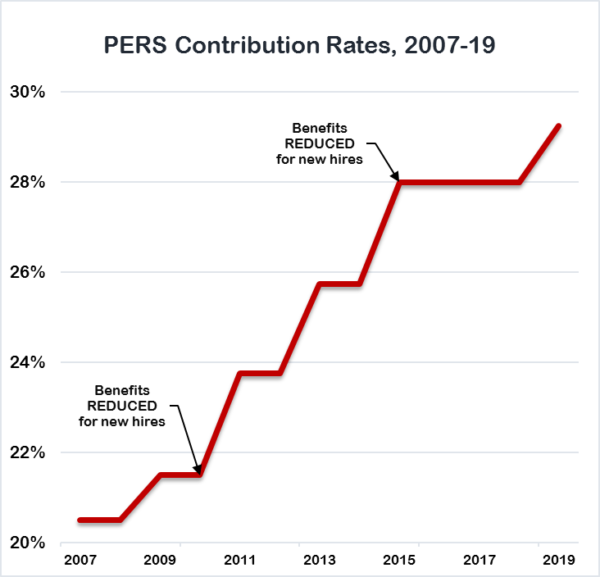
Union opposition to PERS reform hurts public employees the most
Nevada’s government unions have for years successfully thwarted all efforts to reform the state’s public pension system, despite warnings from experts that it would be their own members who would suffer the most in the event of an economic recession or stock market downturn.
Sadly, that time has now arrived. Plummeting tax revenues from the coronavirus fallout will leave many agencies unable to pay their ever-growing PERS bill, leaving them no choice but to cut salaries and lay off government workers.
Even in good times, the cost to keep the Nevada Public Employees’ Retirement System (PERS) afloat imposed a tremendous burden on taxpayers and government workers, who were constantly being forced to pay more while getting nothing back in return.
Despite a record-long stock market bull run over the past decade, the cost to keep the system afloat continued to grow at a remarkable pace. Today, the PERS contribution rate for most public employees is at an all-time high of 29.25 percent — up 36 percent from 2009.
This means that every $100 in salary paid to a teacher or other public employee now requires an additional $29.25 contribution to PERS, with taxpayers and employees splitting this cost evenly. Police and fire officers are the one exception, as their much richer benefits cost 42.5 percent of pay, with taxpayers seemingly bearing the entirety of that cost.
In total, taxpayers and public workers will send $2.2 billion to PERS this year — or more than triple the nearly $700 million in budget cuts that the state is preparing to implement next year as a result of the economic fallout from the coronavirus.
Unfortunately, neither employees nor taxpayers received any benefit in exchange for the past decade’s dramatic cost increase, which is instead spent entirely on debt accumulated from failing to adequately fund the benefits promised to past workers. In fact, almost half of what teachers and other public employees now pay into PERS is spent on this debt, rather than their own, future benefit.
A benefit cut for public employees hired after 2015 furthered this inequity. While government unions like the Nevada State Education Association opposed all reform efforts designed to put the system on a sustainable path — including one that would have likely increased benefits for most of their members — they had no problem supporting a benefit cut for future hires.
As a result, nearly all teachers hired after 2015 will be “net losers,” meaning they will pay more into the system than they can expect to receive back in the form of these recently reduced benefits.
Yet, despite all of this — the record-setting stock market bull run, the constant increase in annual PERS costs, and even a union-sanctioned benefit cut for new hires — the system’s unfunded liability still increased by nearly 60 percent over the past decade, and now stands at an all-time high of $14.3 billion.
One of the agencies most harmed by this broken system is the Clark County School District, which will send roughly $500 million to PERS this year, almost half of which will go towards debt payments.
If the school district were not required to help pay down PERS debt, the savings would be enough to pay for 3,000 new teachers or, alternatively, a $10,000 raise for all current teachers.
In addition to being profoundly unfair and inefficient, this practice of continually pushing costs onto future generations also carries a tremendous amount of risk — as the present situation so clearly illustrates.
As the economic fallout from the coronavirus forces state and local agencies to make significant, double-digit budget cuts in the coming years, the cost to keep PERS afloat will continue to grow, further straining public finances at the worst possible time.
Notably, this would be true even if the stock market were still producing the yearly gains PERS expects. Declining investment returns will simply amplify this trend. Should the stock market revisit the lows seen in late March, for example, PERS unfunded liability would rise to nearly $20 billion.
While taxpayers will bear a large chunk of this cost, those who have the most to lose are government employees themselves.
The unlucky ones will simply lose their jobs altogether, like the more than 100 Las Vegas police department employees that were fired last month. Those who avoid that fate, however, will still feel the PERS crunch through higher contribution rates and further reduced salaries.
While the economic damage caused by the coronavirus was always going to hurt, taxpayers and government workers would be in a better position to deal with it had the Legislature enacted responsible PERS reform.
Unfortunately, short-sighted government unions have consistently opposed all reform efforts, either because they did not understand, or did not care, about the long-term consequences of their actions.
It is a cruel irony that those who will now be most harmed by the PERS crisis are the very same workers those unions claim to represent.
An edited version of this commentary first appeared in the Las Vegas Review-Journal. For more information on PERS, click here.
